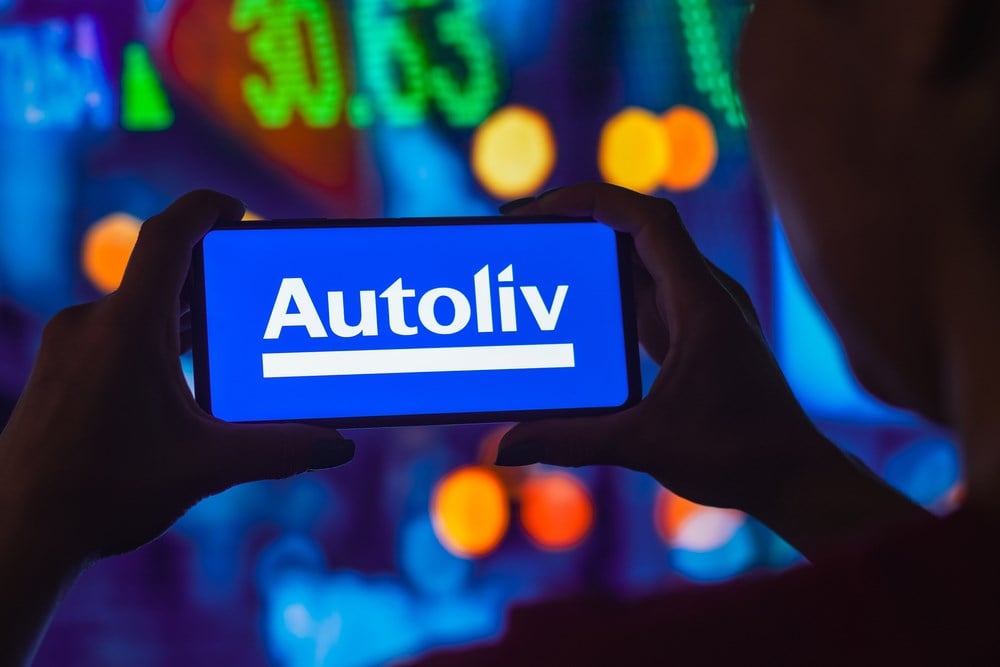
Admit it: If that annoying alarm didn’t go off when you start your car, you probably wouldn’t think much about your seatbelt these days, as it’s become pretty much reflexive to buckle up. That means you’re probably not aware of Sweden-based Autoliv Inc. (NYSE: ALV).
Autoliv is the global leader when it comes to manufacturing seatbelts and airbag systems, with a market share of 43%.
If you take a look at the Autoliv chart, you’ll immediately understand why this could be a stock worth watching: Shares gapped up 10.20% on July 21, following the company’s blowout second-quarter earnings report.
Using MarketBeat’s Autoliv earnings data, you can see the company trounced both revenue and earnings views.
The company, headquartered in Stockholm, makes passive automotive safety products, principally airbags, including steering wheels and inflators, and seatbelts.
Worldwide Customer Base
The company’s sales in 2022 totaled $8.8 billion, 66% of which consisted of airbag and steering wheel products, with the remaining 34% consisting of seatbelt products. It has customers and business operations in Europe, the Americas, China, Japan, and other smaller Asian markets.
Asian vehicle producers are becoming increasingly important, mainly driven by growth in Japan. As a group, Asian manufacturers represented around 43% of global sales in 2022, with Japan-based customers accounting for about two-thirds of that total.
China accounted for around 5% of global sales in 2022. European-based brands accounted for 30%, while U.S.-based manufacturers made up 25%.
Stellantis Among Fast-Growing Customers
Globally one of Autoliv’s fastest-growing customers is Stellantis N.V. (NYSE: STLA), maker of brands such as Chrysler, Dodge, Fiat, Jeep, Ram, and several others, including Maserati.
Autoliv also lists General Motors Co. (NYSE: GM) and Ford Motor Co. (NYSE: F) among customers who are putting the pedal to the metal with their buying.
So what’s driving all this growth?
Several factors are at work. Freight costs are coming down from 2022 levels; supply-chain pressures that affected Autoliv’s customers and suppliers have been mitigated; and the chip shortage, which affected customers, has eased.
One problem that plagued the company during the heyday of supply-chain disruptions and Covid-related closures, particularly in China, was that of customers calling off orders.
Revenue Growth Accelerating
Earnings fell in 2022 for those reasons, but growth has been accelerating in the past two quarters. In the second-quarter report, Autoliv noted that customer call-offs volatility had improved.
Revenue grew at double-digit rates in the past four quarters, but the most recent quarter was the best in quite some time, with sales up 27% and earnings up 114%.
For the full year, Wall Street is eyeing earnings growth of 48% to 6.50 a share. That was recently revised higher. Next year that’s seen rising by another 43%, to $9.30 a share.
Autoliv reiterated its full-year guidance, saying it expects sales to grow by around 15%.
Price Increases & Cost Cuts
In a statement in the earnings release, CEO Mikael Bratt said, “We achieved the price compensations from customers we planned for,” referring to price increases. The company is also undergoing a structural cost-cutting program. First steps include closing manufacturing facilities in Germany and England, as well as a sales office in Italy.
The company intends to reduce its total workforce by up to 11%, as it’s looking to slim down operations after the impacts of inflation in 2022.
With the post-earnings price move, Autoliv stock zoomed past a cup-pattern buy point above $98. Buyers were in charge, as turnover was 259% higher than average.
Shares closed July 21 at $102.78, 4.9% above their buy point, a clear indication of institutional support.
How To Buy A Breakaway Gap
Here’s a way to consider buying a stock that gaps sharply higher as a result of earnings or some other development: On the stock’s chart, find the price after the first five minutes of trading. That gives you some leeway to eliminate noise in the opening few minutes. Using MarketBeat charts, you can set a one-minute view of price action. If you use bars or candlesticks, versus a line chart, you can get the most granular view.
For example, using the chart, you can see that after five minutes on July 21, Autoliv shares were trading at $98.08. To avoid getting caught up in perfectly normal profit-taking after a gap-up, the ideal buy point would be no higher than $102.98.
That’s not too far above the current price, but investors who miss that may soon find an alternate opportunity if the stock pulls back to support at a key moving average, such as the 10-day or 21-day.





